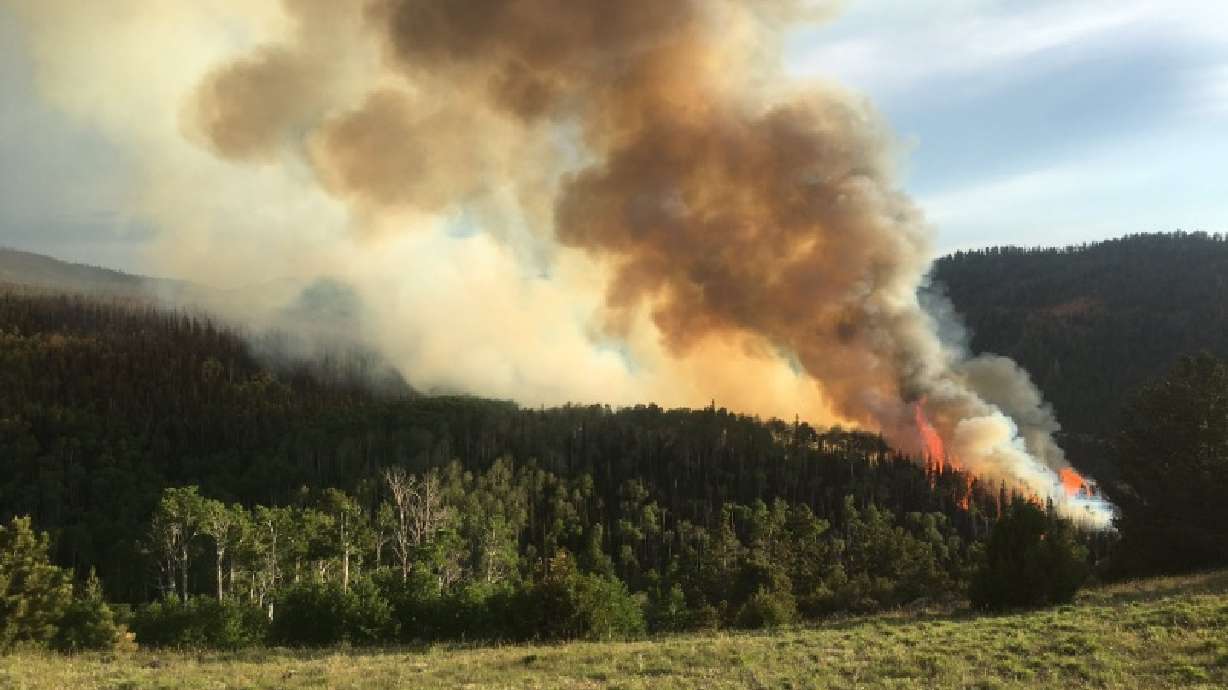Estimated read time: 3-4 minutes
This archived news story is available only for your personal, non-commercial use. Information in the story may be outdated or superseded by additional information. Reading or replaying the story in its archived form does not constitute a republication of the story.
PROVO — Attorneys for a cabin owner charged with accidentally starting the massive Brian Head Fire are seeking to show that firefighters and forest managers mishandled their jobs before the blaze torched 71,000 acres, according to prosecutors who want to prevent a jury from seeing such evidence.
The state says the criminal case against Robert Ray Lyman isn't based on the ultimate size of the 2017 fire, and the irrelevant information could confuse jurors, show court filings from last week. They also give a play-by-play account of how investigators believe the 62-year-old Lyman sparked the blaze.
A judge in Provo's 2nd District Court has yet to rule on the motion, which says Lyman's attorneys have claimed the blaze was mismanaged by firefighters after the forest was allowed to get too dry. Defense lawyer Andrew Deiss did not immediately return a message seeking comment on Friday.
At about 110 square miles, the blaze near Parowan spanned an area the size of Salt Lake City and cost $34 million to fight. It also torched more than a dozen homes in the southern Utah resort community and forced 1,500 people to evacuate.
Lyman, a retired teacher and basketball coach who vacationed at the cabin, was first charged with starting the fire in July 2017. His attorneys successfully argued the case should be moved out of Iron County because he is hated there and might not get a fair trial.
The case was transferred to Provo, where prosecutors tweaked the allegations against him in amended charges filed on June 3. He has not entered pleas in the modified case, and a new preliminary hearing is scheduled for July 30.
Initial Coverage:
Prosecutors say the fire's size could come into play if Lyman is convicted and a judge must determine how much restitution he owes. At the time of the fire, state officials said the person who sparked it may be responsible to cover the costs.
A spokeswoman for the U.S. Forest Service and a spokesman for the Utah Division of Forestry, Fire and State Lands both declined to comment Friday on the recent court filing.
The state's motion to exclude some evidence from trial also sheds light on how investigators believe the fire started:
• Authorities originally said a weed torch first ignited the blaze, but prosecutors allege Lyman used charcoal lighter fluid to burn a pile of branches and sticks behind his cabin on state Route 143. The debris came from trees that were cleared to create a defensive area around the cabin in the event of a forest fire, court documents show.
• While Lyman estimated that the pile was roughly 6 feet in diameter and 3 to 4 feet tall, investigators who analyzed the ash pattern believe it was 12 feet wide and near a second pile similar in size. Before setting the mound on fire, Lyman tried to rake debris to keep it from spreading to brush and trees uphill and placed water around it to prevent the spread, prosecutors say.
• Lyman told investigators that minutes after he set the pile aflame, the fire spread uphill and into the trees within five to 10 minutes. "He said that it had been a calm morning until he lit the fire, then a breeze pushed the fire uphill and toward where he was standing," wrote Shane Klenk, chief deputy Iron County attorney. Lyman dumped a jug of water along its path to no effect and tried to move debris but got too exhausted and called 911.
Lyman is accused of reckless burning, a class A misdemeanor, by starting the fire and either putting people in danger or by causing more than $1,500 in damage. Earlier charging documents did not mention the damage threshold. Additionally, Lyman faces a charge of burning without a permit.
If convicted on the reckless burning count, he could face up to a year in jail and a $2,500 fine. Burning without a permit can result in up to six months in jail and a $1,000 fine.











